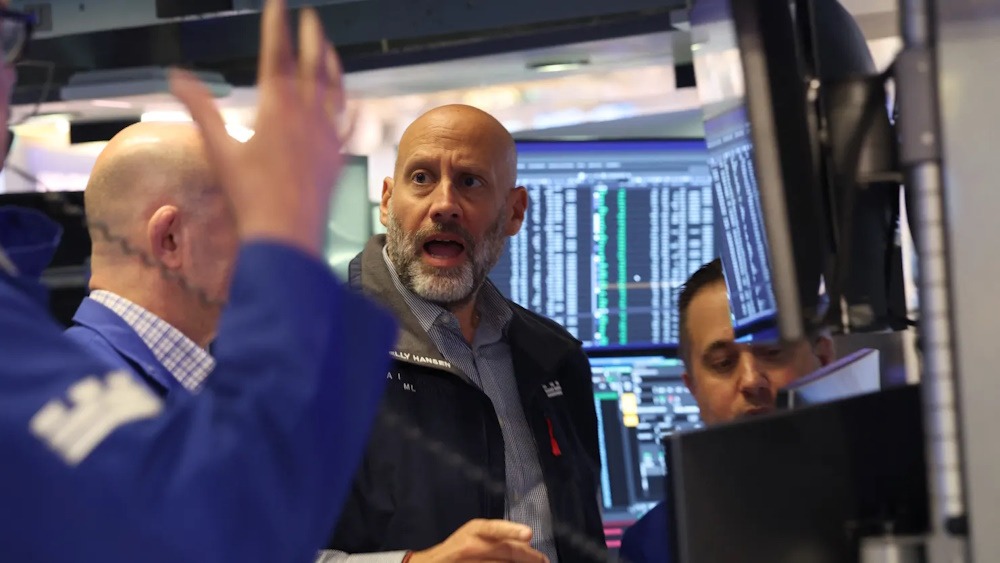
Dow futures are unsettled ahead of inflation data that could clarify the Federal Reserve’s interest rate direction. Just days after the old head was fired after a dismal jobs report, the Heritage Foundation’s chief economist is named the new BLS commissioner. Elon Musk accused Apple of favoring OpenAI’s ChatGPT on its App Store over xAI’s approach.
Tuesday’s Dow futures ranged around the flatline as investors awaited inflation data. By 02:58 ET (06:58 GMT), the contract had climbed 75 points, or 0.2%, dipped 7 points, or 0.1%, then fallen 38 points, or 0.2%. In the previous session, Wall Street averages fell as Nvidia and Advanced Micro Devices agreed to give the U.S. government a 15% share of their artificial intelligence chip sales to China. Both firms’ shares fell 0.35% and 0.28%, respectively, as experts worried that the levy may hurt margins and set a precedent for the White House to tax important exports. Analysts at Vital Knowledge said traders seemed to shrug at President Donald Trump’s announcement of a 90-day trade truce renewal, adding that it was “widely expected.” Tuesday marked the end of the detente from earlier this year.
Tuesday brings the latest monthly consumer price index, which will highlight economic data. The closely watched inflation indicator is predicted to rise to 2.8% in the year to July and fall to 0.2% month-over-month. Stripping out volatile categories like food and fuel, “core” CPI is expected to rise 3.0% year-over-year and 0.3% monthly. The fresh figures may influence the Federal Reserve’s interest rate decision next month, analysts say. A dismal July jobs data and dramatic downward revisions to June and May readings have raised betting that the central bank would cut borrowing prices by 25 basis points at its September meeting. As a result, any hint that inflation is either in-line or below predictions could further bolster these wagers. However, hotter-than-expected price growth may give policymakers pause, especially since the Fed has recently become more hesitant about rate cuts due to concerns that Trump’s aggressive tariff program will push up inflation. Trump wants rapid and severe drawdowns, but the Fed’s July policy decision showed resistance to the “wait-and-see” approach.
After Trump removed the Labor Department’s Bureau of Labor Statistics commissioner after last month’s disappointing jobs report, inflation numbers may raise issues about official data dependability. Trump accused Erika McEntarfer, BLS director, of doctoring numbers to hurt him politically without evidence. Trump selected economist E.J. Antoni to replace McEntarfer on Monday. The Senate must still confirm the appointment. Antoni, an economist with a doctorate, has heavily criticized the BLS, which collects and publishes economic data for investors, companies, and politicians. Trump tweeted, “E.J. will ensure that the Numbers released are HONEST and ACCURATE.” Antoni, the Heritage Foundation’s head economist, has drawn some criticism from Reuters analysts. The nomination may boost private-label data demand, they said.
Musk said his artificial intelligence business xAI will take “immediate legal action” against Apple’s App Store for favoring OpenAI’s ChatGPT. Musk wrote on X late Monday that Apple’s actions “make it impossible for any AI company besides OpenAI to reach #1 in the App Store, which is an unequivocal antitrust violation.” The Tesla CEO wondered why X and xAI’s chatbot app Grok weren’t in Apple’s “Must Have” section despite being the world’s top news app and fifth-ranked app overall. You playing politics? What’s up? Musk claimed ChatGPT is “in every list where (Apple has) editorial control.” OpenAI CEO Sam Altman said, “This is a remarkable claim given what I have heard alleged that Elon does to manipulate X to benefit himself and his own companies and harm his competitors and people he doesn’t like.”
As expected, the Reserve Bank of Australia cut interest rates and said it will likely soften monetary policy as inflation cools. The RBA dropped its benchmark rate to 3.60% from 3.85% on Tuesday, the third this year. The easing cycle began in the first quarter. Slowing inflation will likely lead to future rate reduction, said the RBA. It also forecasts GDP growth below 2% in 2025.
